People 47
At The Rosenberg Memorial
Remarks by professor Jose Altschuler, a Cuban electrical engineer at the Havana, Cuba memorial to Julius and Ethel Rosenberg, June 19, 2018. Though retired, Altschuler remains dedicated to the history of science and technology, about which he has written several books.
Thanks to Karen Wald who shared this information which came from the speaker himself. It’s been reformatted from PDF for easier reading on the web. None of his words have been changed.
=======================================================
From: Jose Altshuler <jea@infomed.sld.cu>
Date: Sun, Jul 15, 2018 at 5:22 PM
Subject: Re: ANNIVERSARY
To: <karenlee726@gmail.com>
Dear friends,
Invited by the Cuban Institute for Peoples’ Friendship and the Cuban Movement for Peace and Peoples’ Sovereignty, we are gathering here today to pay tribute to the exemplary verticality and courage with which the Julius and Ethel Rosenberg couple faced their electric chair execution on June 19, 1953 -exactly 65 years ago, victims of a politically motivated sentence during the Cold War and the American “witch hunt” times.
There is really no room for a different interpretation since on the preceding June 2, they had flatly rejected the official offer of saving their lives in exchange for “confession” and “full cooperation”. “If we are executed shame will fall on the United States Government” -they said at the time. Add to this the offer which was previously made to Ethel that her life would be spared if she agreed to certain requirements, a proposal that she rejected angrily, calling it a “devilish scheme.”
While the execution was taking place inside Sing Sing prison, hate demonstrators outside carried placards with the inscription “Death to the communist rats!” -Jean-Paul Sartre described the show as a “legal lynching that covered with blood the whole country.” Countless appeals and clemency requests coming from all around the world had been rejected, including those by the great Albert Einstein and the Vatican.
At the time, President Eisenhower declared that the executions were a “serious matter. And even more serious -he added –if one thinks of the millions of dead whose death can be directly blamed to what these spies did.”
It is quite paradoxical that this was said by the president of the only country in the world that had dropped atomic bombs, killing tens of thousands of civilians of a practically defeated enemy country, with no other purpose than trying to frighten a victorious allied power, according to knowledgeable analysts.
But there is much more to this. Which will be seen in the following reproduction of four brief paragraphs from an article by William J. Broad published in the United States on 12 November 2007, which I downloaded from the web not too long ago.
This is what they say:
On Nov. 2, the Kremlin startled Western scholars by announcing that President Vladimir V. Putin had posthumously given the highest Russian award to a Soviet agent who penetrated the Manhattan Project to build the atomic bomb.
The announcement hailed Dr. [George] Koval [who died in 2006, aged 93] as “the only Soviet intelligence officer” to infiltrate the project’s secret plans, saying his work “helped speed up considerably the time it took the Soviet Union to develop an atomic bomb of its own.”
Washington has known about Dr. Koval’s spying since he fled the United States shortly after the war but kept it secret.
“It would have been highly embarrassing for the U.S. government to have had this divulged,” said Robert S. Norris, author of […] a biography of the project’s military leader.
I guess it is not necessary to insist on the subject to clearly show to what extent the Rosenbergs were demonized for an essentially political purpose.
Still, the cruelty to which they were subjected could be explained more precisely by taking into account the fact that their case was aired at the height of the Cold War, in full development of the McCarthy “witch hunt” during the Korean war -though the alleged facts under trial had taken place during the Second World War, when the Soviet Union was an ally of the Western powers. It was for this reason that, on March 2, 1950, the German scientist Klaus Fuchs, strongly involved in the transfer of information to the Soviets, was sanctioned in England only to 14 years in prison -the maximum penalty for passing military secrets to a friendly country. He was granted full reprieve after serving 9 years and 4 months.
On the subject just mentioned, I believe it is very illustrative to recall the following quite exceptional testimony that a participant in the atom bomb project from the British side, Professor Joseph Rotblat, published in the August 1985 issue of the Bulletin of the Atomic Scientists. Here is what he says:
In March 1944 I experienced a disagreeable shock […]
During [a conversation at the home of Prof. Chadwick, the head of the Manhattan Project, General Leslie Groves,]said that, of course, the real purpose in making the bomb was to subdue the Soviets […] Although I had no illusions about the Stalin regime […] I felt deeply the sense of betrayal of an ally […] when thousands of Russians were dying every day on the Eastern Front, tying down the Germans and giving the Allies time to prepare for the landing on the continent of Europe. […] Until then I had thought that our work was to prevent a Nazi victory, and now I was told that the weapon we were preparing was intended for use against the people who were making extreme sacrifices for that very aim.
Shocked by such a terrible reality and already knowing at the time that Germany did not have any possibility of manufacturing the bomb, early in 1945 Rotblat managed to leave the Manhattan Project and return to Great Britain. Since then he dedicated his life to the struggle for a peaceful world and the elimination of nuclear weapons, for which he was awarded in 1995 the Nobel Prize for Peace.
“It would […] be wrong and imprudent to entrust [to others] the secret knowledge or experience of the atomic bomb, which the United States, Great Britain and Canada now share”— declared Winston Churchill in the famous speech which he delivered in Fulton, Missouri, barely seven months after the atomic bombing of Japan.
That was exactly opposite to the very serious warning personally given to Prime Minister Churchill and to President Roosevelt in 1944 by the world respected Physics Nobel prize, Niels Bohr, that hiding the work on the atom bomb from its wartime ally, the Soviet Union, would necessarily provoke mistrust and give rise to an extremely dangerous nuclear arms race. Needless to say, this became very soon a sad fact of life.
In 1946, the year after Hiroshima and Nagasaki, President Truman gave the USSR an ultimatum to evacuate a province of Iran, or else have the United States drop atomic bombs on the Soviet Union itself. Three years later the Soviets detonated their first nuclear device, which they were forced to develop while their country was still in ruins from the Second World War that had cost them more than 20 million lives. In 1953 president Eisenhower threatened North Korea and China with the use of nuclear weapons. It was in this context that Julius and Ethel Rosenberg were executed in the United States 65 years ago, on a day like today. Some five weeks later, a military bulwark of the pro imperialist tyranny then in power in this country was attacked by a group of Cuban revolutionaries led by Fidel Castro. At the court that tried him and his surviving comrades, he took up his own defense and that of his ideals of social justice. “It doesn’t matter if you condemn me; history will absolve me”, he concluded. “We will be vindicated by history”, the Rosenberg’s had said.
The very fact that we are now gathered around this memorial bears witness to the prophetic character of Fidel’s words, so similar to those of the Rosenbergs. Let us hope that sooner than later memorials of this kind may find their place in other places, where Cubans and Americans can get together in peace, mutual respect, and solidarity, as we are here today.
Thank you very much.
Harlan Ellison, Dies at Age 94

Harlan Ellison, Writer of Star Trek Series, Dies at 84
The famous science fiction writer died this Thursday in Los Angeles
By Juventud Rebelde
digital@juventudrebelde.cu
A CubaNews translation.
Edited by Walter Lippmann.

Fans and celebrities on social networks mourned the death of the famous writer. Photo: Actualidad RT Published: 29/06/2018 | 10:27 am
Harlan Ellison, a prolific and outstanding writer of novels and short stories specializing in fantasy, horror and, above all, science fiction, died this Thursday in Los Angeles at the age of 84 in his sleep, according to RT.
His publications include over 1700 short stories, novels, scripts, and essays on literature, film, television, and print media. He also worked as an editor and anthologist, especially the anthology Dangerous Visions, paradigmatic of the New Wave movement (a global term for various pop/rock styles from the late 1970s and mid-1980s). Ellison won numerous awards, including several Hugos, Nebulas and Edgars.
Among his most famous stories are The Beast Who Cried Love in the Heart of the Universe, I Have No Mouth and Must Shout, or Repent, Trickster,” said Mr. Tick-tock.
He also starred in numerous incursions into the world of comics and participated in some of his most popular collections such as The Incredible Hulk, Daredevil, Batman and The Avengers.
Photographer Christine Valada spread the news on Twitter at the request of Susan Ellison, wife of the prolific writer, who is known worldwide as the scriptwriter of the 1967 episode of “The City on the Edge of Forever” in “Star Trek” and is considered one of the most wonderful in the series, according to La Vanguardia.
Valada also published Ellison’s farewell phrase, which reads: “For a short time I was here and for a short time I mattered. The author’s literary career includes short stories that were later adapted for cinema as “A Boy and His Dog”.
Series such as “The Man from U.N.C.C.L.E”, “The Starlost” and “The Twilight Zone” also had their mark.
Many fans and celebrities on social networks mourned the writer’s death: “There was no one like him in American literature and there never will be. Angry, funny, eloquent, immensely talented,” said best-selling writer Stephen King.
Chef Anthony Bourdain Dies

Famous international chef Anthony Bourdain dies
After a fruitful career as a chef in various restaurants in New York, Bourdain wrote his memoirs Adventures in the Culinary Belly and began his successful television career.
Published: Friday 08 June 2018 | 11:16:33 AM
By Juventud Rebelde
digital@juventudrebelde.cu
A CubaNews translation.
Edited by Walter Lippmann.

The famous chef was in Havana in 2011 to film a program from the series No Reservations Author: Twitter Published: 08/06/2018 | 11:12 am
PARIS, June 8.- Popular American chef Anthony Bourdain, 61, committed suicide in France on Friday, according to the CNN television network for which he worked.
Bourdain was in France preparing an upcoming program and his friend Eric Ripert, a French chef, found it without knowledge, the source said.
After an intense career as a chef in various restaurants in New York, Bourdain wrote his memoirs Adventures in the Culinary Belly and began his successful television career.
In 2012 he expanded his audience with his new television program Parts Unknown, in which he interviewed then-President Barack Obama. He received the prestigious Peabody Award in 2013.
Bourdain reportedly hanged himself and his body was found in a hotel room in Strasbourg, France.
The famous chef was in Cuba in 2011 to film a chapter of the No Reservations series and then repeated his trip to the island with the Parts Unkown program in September 2015. From the Caribbean nation he showed off the most traditional cuisine, passionate baseball and vintage cars.
It is with extraordinary sadness that we can confirm the death of our friend and colleague Anthony Bourdain, CNN said in a statement, in which it confirmed that the cause of death was suicide.
One of Anthony Bourdain’s most famous phrases is “Your body is not a temple, it is an amusement park”.
My Return to Alma Mater
My Return to Alma Mater, or, Proximities and Political Clashes
May 31, 2018
Translated and edited by Walter Lippmann for CubaNews.
Thanks to Alma Mater, specifically its director Mayra García Cardentey, for insisting that I write again for the magazine of the Cuban university community, the one in which I once collaborated in the early 1990s, when I was still studying journalism.
I remember with particular satisfaction those years when the publication almost disappeared due to lack of paper, and with a thousand efforts we rescued it in a tabloid format, almost a pamphlet, of bad material and worse printing, which luckily never came back.
With not very different difficulties for its print run in this 21st century, its young collective decided to bet on new technologies, and does not wait for its graphic editions to disseminate the texts it produces and proposes to its reading public.
So it is an honour for me to be able to collaborate again with the magazine founded by the beautiful and courageous communist Julio Antonio Mella, as far back as 1922.
Now, no longer so young or unredeemed, I offer only my humble opinion on matters where it is the new generations who teach me a little more each day, and I – a tepa that I refuse to grow old – try to accompany them at the rate that my (in)capacity allows me.
Here I am reproducing the comment that I was published in Alma Mater.
Political debate and social networks in Cuba: Proximities and clashes
Social networks on the Internet are a relatively new and growing scenario of political participation, which in Cuba complements the options, not infrequently too formal or uniform, that we already had for the exchange of ideas.
It’s not often, but still happens, that someone tries to question the motley and seemingly chaotic political affiliation of my friends on Facebook, or the strategy of moderating comments on my blog www.paquitoeldecuba.com. The answer I give is almost always the same: in order to exchange with fellow members I already have enough space, I am interested in debating and learning about other points of view.
I use this personal example to illustrate an increasingly evident reality. Social networks on the Internet are a relatively new and growing scenario of political participation, which in Cuba complements the options, not infrequently too formal or uniform, that we already had for the exchange of ideas.
It is no secret that regardless of the extroversion and spontaneity with which Cubans ventilate about any economic, social or political aspect of daily life, the specific forums for such discussion – including political, student, professional and mass organizations – can be quite reluctant or hermetic to channel or reflect in public the natural diversity of thoughts that exist within them.
Faced with this fact, social networks would seem to be in the Cuban context a much more flexible, horizontal and visible alternative for direct confrontation between different political positions. But beware. Let us not be too naive either.
Block or learn to accept?
Asymmetry is the first and main flaw that I would identify in that ideal state of participatory and democratic dialogue that social networks on the Internet want to appear to be (and to some extent achieve).
In the very nature of its functioning, the interests and ideology of capital and the system that represents it predominate: capitalism. We may or may not be aware of, be or not more sensitive to or aware of the manipulation that is proposed to us as a tendency, but it is an element that we should not ignore.
Advertising, consumerism, violence, individualism, are motives that from their innards – hidden or not – drive the networks. Of course, it is possible to take a critical, political stance in the face of these proposals, and even to oppose them with other values that we would pretend to be closer to Cuban society, such as humanism, solidarity, altruism and equity.
But this implies, without a doubt, an intense and profound training in the art of doing and influencing politics. And here comes another key disadvantage for our people, beyond even any generational or other considerations: the lack of civic practice we have of political debate, and I would add that of almost any kind of debate.
Agreeing or finding a consensus between more than two people can be complicated in our daily lives. It is still very difficult for us to listen to and respect a different approach than the one we defend. As a result, even in the midst of an alleged dialogue on social networks, violent reactions, offenses and disqualifications can abound, and ultimately it is easier for us to block, eliminate and disappear the other person from our contacts than to try to reason or accept disagreement.
Crimes of cordiality against them
There are concrete practices in the management of social networks that favor or hinder political debate among several people or groups of people. Without pretending to make a recipe book, because everyone builds their cyberspace according to priorities and interests, I would risk commenting on some variants according to my experience.
The first thing is the audience we select and give access to our profiles or admit them to our personal pages. As I said at the beginning, there is not much use – if we want to promote a political exchange, and not just maintain family or playful relationships in the networks – in reducing our circle to those who think in a very similar way to ourselves.
Here I would like to warn about a curious phenomenon that social networks on the Internet reveal within the Cuban political spectrum: the wide variety of positions on dissimilar issues, even among friends, colleagues, relatives and other people who perhaps in other contexts would seem to have coinciding positions.
The feasibility of a freer discussion, with a greater number of actors and actresses, today gives as a result of the political debate in the social networks a clearer and more public perception that unanimity is not necessary – impossible, moreover – to achieve unity, as long as we do not intend to impose a single line of thought or action. It is also important not to be invasive or abusive of other people’s spaces. This recommendation applies to any use of networks, but is particularly relevant when we talk about political debate.
Labeling other people constantly in our publications, indiscriminately breaking into other people’s walls, introducing or replicating information that is foreign to a discussion already underway, to take advantage of the visibility of a debate that we are not initiating, are some of the crimes against cordiality that are most damaging to the healthy and respectful exchange of criteria in social networks and other collaborative spaces on the Internet.
New and renewed militancies
I could not conclude this brief analysis without mentioning the importance of social networks to stimulate, make visible and coordinate multiple social and political activities in Cuba today.
With a traditional civil society whose institutions may seem to us to be aging or which subsist more because of the inertia and convenience of political power than because of its effectiveness in mobilizing citizens, cyberspace – with its social networks, blogs and other alternative publications – would seem to be reactivating and even creating militancies that did not exist in Cuba or were not very visible enough to achieve real political impact.
Issues such as racial, gender, sexual orientation or identity discrimination, animal and environmental protection, among many other noble and controversial causes, with political implications and debts still important in our context, emerge in social networks through multiple individual and collective initiatives.
On more than one occasion, they have already managed to overcome scandal or media pressure to achieve specific solutions or actions on the part of the institutions or entities responsible.
In this effort, the work of the most formalized organizations and organizations is praiseworthy for trying to insert their messages and communicative proposals into the whirlpool of the Internet, and even to stop and provide a direct response to the people who demand and control them through social networks. This can contribute in the medium and long term to articulating a more direct relationship between the State and the government with the citizenry. Also through these digital channels, in what would be another way – with the addition of their greater transparency, immediacy and public character – of strengthening the participatory and democratic ideal of socialism.
Who is Paquito el de Cuba?
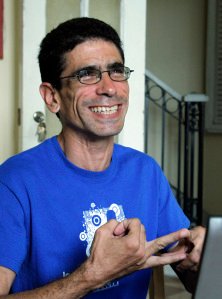
Cuban blogger Francisco Rodriguez Cruz known as Paquito from Cuba declares:
I am Fan of Jose marti, I am journalist communist and gay Photo taken on
Sept.29.2010. in Havana, Cu ba By Jose Goitia
I am Paquito, from CUBA; I am a Marti follower and a an author; I am a communist and gay journalist; I am a convinced and superstitious atheist; I am the father of a son whom I have adored and have been a partner for fifteen years with a seronegative man who loves me; I have been an AIDS patient since 2003 and am a survivor of non-Hodgkin’s lymphoma for more than twelve years; I am a university professor and a student of life; a follower of Cuban economic issues and a passionate devourer of universal literature; an incontinent and belligerent moderate; a friend of my friends and a compassionate friend of my enemies; often wrong and never repentant; a hardened and eternal enthusiastic optimist; alive and kicking; in short, another ordinary man who wants to share his story, opinions and desires with you…
Charlise Theron Might Leave the US

Charlise Theron Might Leave the US, Fearing its Racism
April 16, 2018
Translated and edited by Walter Lippmann for CubaNews.
 Actress Charlize Theron said she is considering leaving the United States for the sake of her two adopted children because she is concerned about racism in the country, where “she is much more alive than people thought.”
Actress Charlize Theron said she is considering leaving the United States for the sake of her two adopted children because she is concerned about racism in the country, where “she is much more alive than people thought.”
Separated from actor Sean Penn since 2015, the actress is the single mother of two children, a boy, Jackson (6), and a girl, August (2), adopted in South Africa.
Concerned about the issue of racism in the United States, she said that “it exists and is much more latent than people thought.”
“We can no longer deny it. We have to raise our voices. There are places in this country where if I were offered a job there, I wouldn’t take it,” he continued. “I wouldn’t take my kids to certain parts of America and that’s pretty problematic.”
Interviewed by Elle magazine, she said she has only her mother, Gerda, to help her raise her children. “I’m so lucky to have her, without her I’d feel so alone in all this,” she said.
“Many times I look at my children and tell them: if this continues, I will have to (leave the United States). Because the last thing I want is for my children to feel insecure,” added the 42-year-old star, born and raised in South Africa during the apartheid era in that country.
“They’ll have to know that it’s a different climate for them than it is for me, and how unfair it is,” the Oscar winner said of her children.
Theron is promoting her new comedy, “Tully”, which will be released on May 4.
On the other hand, in the cover interview for Elle magazine, Theron spoke about the difficult adoption process she faced.
“I never saw the difference between raising an adopted child and a biological child. I don’t feel like I’m missing anything,” he said. “It was always my first choice, even when I was in a relationship.”
The actress recalled that she suffered “a lot during the process”. “Among the hardest times in my life was when I filed the adoption papers; it really destroyed me emotionally,” she said. “There were so many situations that didn’t work and you get attached and you get excited and then you get devastated.
Theron remembered that she had always dreamed of adopting a child. “I’ve always been aware that there are many children in the world who don’t have families,” she said.
(With information from Ansa)
Rita Hayworth and Gossip

Rita Hayworth and the Globalization of Gossip
April 3, 2018
 By Rolando Pérez Betancourt
By Rolando Pérez Betancourt
Graduated in Journalism from the University of Havana in 1973. Graduate in French from the Institutes of Foreign Trade and Foreign Affairs. José Antonio Fernández de Castro National Prize for Cultural Journalism (1999), José Martí National Prize for Journalism for the work of life (2007). Journalist at the Granma Newspaper. Attends the weekly program “The Seventh Gate”. He is one of the sharpest film critics in Cuba.
A CubaNews translation. Edited by Walter Lippmann.
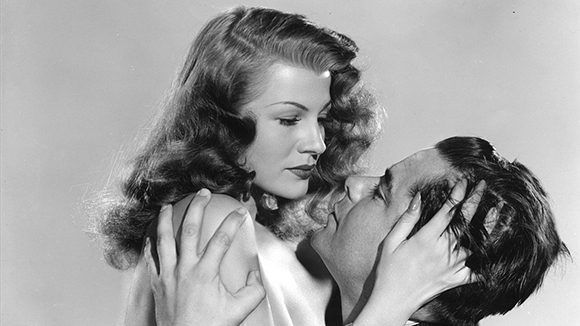
Rita Hayworth in her most famous role, alongside Glenn Ford in “Gilda”. Photo: American Cinematheque/ Los Angeles Times.
Increasingly, the globalization of gossip gains ground from the social and cultural magnitude.
“-Dig this!, Mrs. X divorced Mr. X after finishing her latest movie.”
“Yes, but he was already sleeping with somebody else.”
“With a He, or with a She?”
This is just an example of banal and depoliticized gossip in its comprehensive role of obliterating transcendental reasoning.
Back in the 50s, as a child, I learned about the subject — without understanding it then—by reading the glossy magazines collected by a cousin who, despite spending a fortune in red dye and high heels, never reached her dream of looking like Rita Hayworth and, by chance, marrying a prince from distant lands.
At the time, gossip about show-business celebrities was nothing compared to the explosive levels it reaches today in the huge and dominant information platforms of the Internet, where a headline about the latest mass killing at a school in the United States may rank equally, or below, the latest steamy dress exhibited by Jennifer Lopez, or any other actress with less artistic talent, but with enough curves, public life, or money to keep up with the hype.
These are myths and individual fame aimed at trivializing culture and monopolizing the attention of an audience eager to follow the bombastic life of the rich and famous, instead of the political, cultural or economic events that, in their fabric of human implications, could indeed influence their own lives.
The sensationalism irradiating from individuals is winning the battle from the social fact as part of the US-Americanization of the myth that –without landing craft or air strikes– invades and seduces millions of minds settled in Europe (also an exporter of those empty values), Asia, and Latin America.
“Information” maneuvers with the clear central objective to have de-politicization and banality govern the everyday life of an international society that –according to their plan– should become increasingly more individual and private, and less collective and social.
This cultural model based on sensationalism, the excessive transcendence of the image, and the exaltation of celebrities (true or fabricated), is aimed at focusing popular attention on egocentric principles with numbing effects. It has the same purpose – only now on a scale unimaginable in the mid 20th Century—that one day made my cousin try and fail to look like Rita Hayworth.
Winnie Mandela’s legacy lives on
South Africa’s icon disappears, but her legacy endures
Translated and edited by Walter Lippmann for CubaNews
By Ilsa Rodriguez *
Pretoria (PL) South Africa said goodbye to Winnie Mandela, an icon of the anti-apartheid struggle, with tributes and posthumous awards culminating in a mass tribute in Johannesburg and funerals with the honors of a head of state.
She lives in all of us, in our actions, in guiding our struggles and remains in our consciences, said President Cyril Ramaphosa in his eulogy to tens of thousands of people gathered at Orlando Rugby Stadium in the Soweto neighborhood to pay tribute to her posthumously.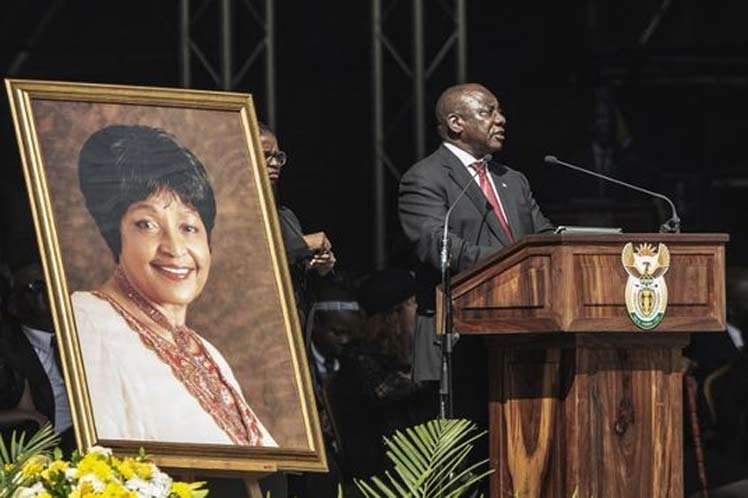
 Nomzamo Winifred Madikizela Mandela, who was born in 1936 in Bizana, Eastern Cape Province, was an unwavering fighter against the regime of racial segregation.
Nomzamo Winifred Madikizela Mandela, who was born in 1936 in Bizana, Eastern Cape Province, was an unwavering fighter against the regime of racial segregation.
Because of her confrontation with segregation laws, protesting the repression and detention of African National Congress (ANC) combatants, including her then husband, Nelson Mandela, Winnie was tortured, imprisoned and isolated, and was the victim of a defamatory campaign organized for the security of apartheid.
The release for the first time in South Africa of an award-winning documentary about her life, made by the Frenchman Pascale Lamche, presented in the very voices of the perpetrators details of the so-called intelligence operation of the racial segregation regime (Operation Romulus) to defame this courageous woman, a symbol of resistance.
The inclusion in the national and international press of negative stories about Winnie, the pressures on the legendary leader Mandela, who was married to Winnie for 37 years, and other ANC leaders to separate from this indomitable woman recognized as the Mother of the Nation are told with great audacity by agents involved in these actions.
Through Lamche’s film, South Africans learned from the very voice of the apartheid security services exaggerated Vic McPherson that in 1989 he was in charge of a media strategy operation against Winnie and the ANC, and that he had 40 journalists to whom he provided false information to be published on the front page.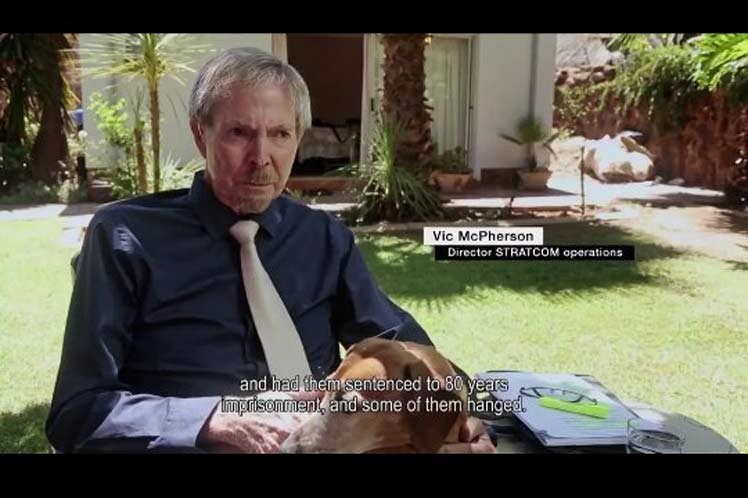
A particular impact had on the citizens of this country was that McPherson narrated these events sitting comfortably in his garden and petting his dogs, who considered the most chilling images of this documentary.
These and other revelations by several of the regime’s exaggers, including former Chief of Intelligence Niel Barnard and former Chief of Police in Soweto Henk Heslinga, brought new admiration in the nation for this woman, considered the face of South Africa during the dark years of repression.
DESERVED HOMAGE Tributes to Winnie, who died on April 2 at the age of 81 after a long illness, began the day after her death with official mourning, flags at half-mast and tributes throughout the country, which had their highest expression in the memorial on April 11, held at the Orlando District Stadium in Soweto. 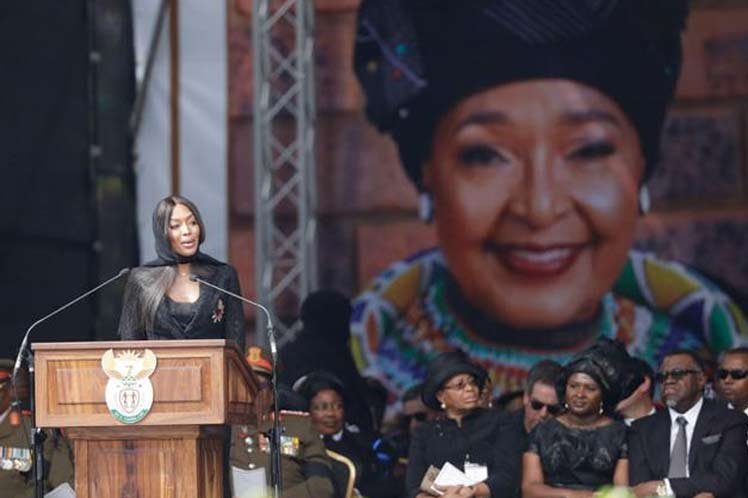
Songs and dances, part of the traditional liturgical ritual of South Africa’s black population, were a constant during the more than four hours of tributes led by Vice President David Mabuza.
In his words, the Vice President said that ‘we are here to mourn the death of a true revolutionary and leader of our liberation, to mourn the death of the Mother of the Nation because a tree that protected us has fallen’.
Mabuza, also vice president of the ANC, said Winnie remained relentless until the last years of her life and throughout her life’you reminded our daughters and mothers that women are powerful and can stand up to men’.
A similar ceremony, convened by Julius Malema’s opposition Economic Independence Fighters (EFF) party, took place on the same day in the Free State province.
TRIBUTES Analysts in South Africa consider that one of the most heartfelt tributes was that of Mandela’s widow, Graca Machel, who dedicated a letter to’her elder sister’ where she says that’you have become one of the brightest stars in the sky, where you will remain forever radiant’.
The extraordinary life you led is an example of great strength and inexhaustible passion, a source of inspiration for all of us on how to face challenges with courage, firmness and unwavering determination…. Thank you for your brilliant wisdom, fierce challenge and elegant beauty’, Graca Machel’s message expressed.
Government and political leaders from various organizations, including the Communist Party, the EFF, the Inkatha Party, and the ANC youth and women’s leagues, among many other voices, expressed their admiration, respect and appreciation for Winnie Mandela’s years of selfless struggle for South Africa’s liberation from apartheid. In the final farewell to Winnie, President Ramaphosa said that her life was dedicated to the unity of the oppressed of all nations and in death ‘unites us all, those close to her and those from many nations and continents, to pay homage and remember her with affection’.
She has shown in her death that our many political and racial differences have been overshadowed by our shared desire to follow her example in building a just, equitable and caring society, she said. The president said Winnie’s conscience and convictions left her no choice but to resist because’she felt forced to join a noble struggle in her purposes, though dangerous to carry out, to speak out when others were silent, to organize, mobilize and lead when those who did were imprisoned or forced into exile. 
He recognized that she lived, like many South Africans, with fear, pain, loss and disappointment, but each day she rose up with the nobility of the human spirit… They tried to denigrate her with bitter, twisted lies…. they wanted to destroy her so that she would lower her eyes and show weakness, but she always stood up.
President Ramaphosa admitted in his eulogy that’we are forced to acknowledge that she often stood up alone….too many times we were not there for her’.
All who appreciated her and recognized her dedication promised to follow her example and fulfill her legacy.
arb/ir
Prensa Latina Correspondent in South Africa.
The Young Karl Marx

The Young Karl Marx
The young Karl Marx can be seen next month on the occasion of the 200th anniversary of the birth of the author of Das Kapital
—————————————————–
Author: Rolando Pérez Betancourt | internet@granma.cu
April 22, 2018 20:04:56
A CubaNews translation.
Edited by Walter Lippmann.

The young Karl Marx can be seen next month on the occasion of the 200th anniversary of the birth of the author of Das Kapital
Next May 5, 200 years after the birth of Karl Marx, this proven director, who is undoubtedly the Haitian Raoul Peck, made the German film The Young Karl Marx in 2017, a film to which even those who do not sympathize with Marxism have had to grant him artistic merit and the rigor of the concepts on which it is based.
The film tells of two young people who did not know firsthand the ruthless exploitation of capitalism in their day – and of course the other is Frederick Engels – and yet set in motion a movement that overflowed the antagonistic politics of their time and has inspired the emancipatory yearnings of millions of people around the world over the course of a century and a half.
Biographical notes on some lives and events that began in 1843 and ended in 1848 with the edition of the Communist Manifesto, years in which Marx and Engels met and solidified an eternal friendship. The director Raoul Peck, adapting himself to the didactic demands of the biopic, shows that even in a genre, the biography, coming from a consolidated literary tradition at the service of bourgeois glorification, back in the 19th century, can innovate and make more attractive a narrative whose vital substance is the weight of ideas. A well-told film with a convincing August Diehl as the young Marx, it is a story not to be missed by those who want to know how a key text of contemporary political thought was forged, which is like saying how the Communist Manifesto was forged.
Haitian Raoul Peck was forced to emigrate with his family to the Congo after the Duvalier dictatorship threatened them with death. He was closely linked to African reality and studied filmmaking in Berlin. His films, such as Lumumba and I’m Not Your Negro, the latter a documentary about racism in the United States that was nominated for last year’s Oscar, highlights the political and social concerns of this filmmaker. Director Peck – and the film makes this very clear – is not interested in wax figures. Hence we will see a passionate young Marx, a troublemaker, a drunkard at times, a Marx with defects, as his wife reproaches him, at times self-sufficient, a person of flesh and blood. Peck’s Marx is also overflowing with a youthful energy channeled under the imperative that happiness, the meaning of life, becomes concrete for him in an act of resistance and constant struggle against social injustice.
A film for any kind of audience, but one that scholars of history and Marxism will enjoy very much as they witness the dialectical battles established between the two young revolutionaries and other figures who understood only part of what the struggle for a new world should be. Thus we will see a gallery of these characters in this story that, faithful to reality, dedicates a special treatment to the women who influenced the life of Marx and Engels, and not only in the love aspect, but also contributing ideas.
Excellent moments are recreated, such as when the young people are introduced and the director conceives the scene as a train wreck, with an ironic Marx reproaching his great friend for the golden buttons he wore on his jacket the day they first met. From the beginning, both face their egos, then show mutual admiration, and finally end up in a night party. From then on they will fight together against censorship and police raids, riots and riots that will augur the strengthening of the workers’ movement, which until then had been disorganized in no small measure.
Although the film takes fictional licenses as is usual in any biography, historically it is impeccable. At the same tim, nourishing new points of view concerning this present of ours, contaminated by many of the contradictions then predominant and perfectly explained in Das Kapital, the film is a masterpiece for then and now. It’s not for pleasure that director Raoul Peck concludes his film with a dynamic editing that alludes to the perennial validity of Marxism. First, we’ll see the historic photo of Mary and Frederick, Jenny and Karl Marx and No Direction Home, played by Bob Dylan, a collage of photos and images that remind us of what the world has been like over the last 60 or 70 years. It’s a way of telling us that the two young friends are still as relevant as when they wrote 170 years ago that a specter was haunting the world.
World Bids Farewell to Winnie Mandela

World bids farewell to Winnie Mandela, Mother of the South African Nation
Leaders from around the world expressed their condolences after the death of the anti-apartheid fighter on Monday.
——————————————————————————–
Author: International Editor | internacionales@granma.cu
April 3, 2018 20:04:36
A CubaNews translation.
Edited by Walter Lippmann.
PRETORIA: Leaders from around the world expressed their condolences after the death on Monday of Winnie Mandela, a woman whom the current South African president described as “the voice of challenge and resistance in the face of exploitation and repression by the apartheid regime”.
In a message released yesterday in Pretoria, the head of state and government, Cyril Ramaphosas, further noted that “Winnie was a champion of justice and equality and that throughout her life she contributed to the struggle through sacrifice and persistent determination”.
The news of the death of Winnie Madikizela-Mandela, 81, on Monday, April 2, at the Netcare Milpark Hospital in Johannesburg, South Africa, was reported by family spokesman Victor Dlamini. He said that “we want to communicate with deep sadness that she has passed away,” he said.
The African Union (AU), in the words of its Commission Chairman, Moussa Faki Mahamat, also expressed shock and sadness at the death of Nelson Mandela’s second wife, reported Prensa Latina.
Also joining in the condolences was Iran’s Foreign Minister, Mohammad Yavad Zarif, who addressed his condolences to the South African people in general and to the supporters and all those who follow the thought and beliefs of the anti-apartheid icon Nelson Mandela.
Alluding to the four long decades of struggle against apartheid alongside Mandela, he noted that Winnie’s death had caused South Africa and the world pain.
From a closer latitude, Evo Morales, president of the Plurinational State of Bolivia, expressed his solidarity with the South Africans for the loss of the one considered by many “mother of the nation” of South Africa.
Morales’ message on Twitter states that the second wife of South African leader Nelson Mandela “was and will be a symbol of the struggle for freedom and equality.
In 1994, after the first democratic elections, Madikizela-Mandela was appointed deputy and vice-minister of Art and Culture. Since then, she had been a member of parliament and remained a leading figure in the African National Congress (ANC), the governing body in South Africa since the first democratic elections after the end of apartheid, in which she won together with Mandela’s victory in 1994.
The South African government announced yesterday that on April 14 Winnie Mandela will be sent off by her people with state funerals, after President Cyril Ramaphosa visited her family in Soweto to express his condolences and support directly to them.
Winnie Mandela Passes On

Winnie Mandela, A Symbol of the Anti-Imperialist Struggle in South Africa, Passes On
South African activist and politician Winnie Madizikela Mandela passed away on Monday at the age of 81, her personal assistant said on Monday.
——————————————————————-
Author: Digital Editor | internet@granma.cu
April 2, 2018 11:04:04:04
A CubaNews translation. Edited by Walter Lippmann.
Veteran anti-apartheid fighter Winnie Mandela, who became a reflection of South African women during the years of repression against the majority black population, died Monday at 81, Prensa Latina reported.
Spokeswoman Zodwa Zwane confirmed that Winnie passed away this afternoon and that the family will issue a statement within a few hours.
Nomzamo Winifred Madikizela was born in 1936 in Bizana, Eastern Cape Province, and moved to Johannesburg in 1957 to study Social Work, when he met the legendary leader Nelson Mandela, whom he married the following year and had two daughters. The marriage ended in 1996.
An icon of women’s struggle and resistance in this southern African country, Winnie is remembered for her confrontation with the racial segregation authorities in South Africa, her political harangues and her participation in black workers’ strikes when her then-husband was imprisoned with other leaders of the African National Congress (ANC) on Robben Island.
In 1993, she was elected president of the ANC Women’s League, Minister of Art, Culture, Science and Technology in the first government after the end of apartheid, and left her official position in 1996.
Until her death she was involved in community work at his residence in Soweto.
Subscribe to Blog via Email
| M | T | W | T | F | S | S |
|---|---|---|---|---|---|---|
| 1 | 2 | 3 | 4 | 5 | 6 | 7 |
| 8 | 9 | 10 | 11 | 12 | 13 | 14 |
| 15 | 16 | 17 | 18 | 19 | 20 | 21 |
| 22 | 23 | 24 | 25 | 26 | 27 | 28 |
| 29 | 30 | 31 | ||||

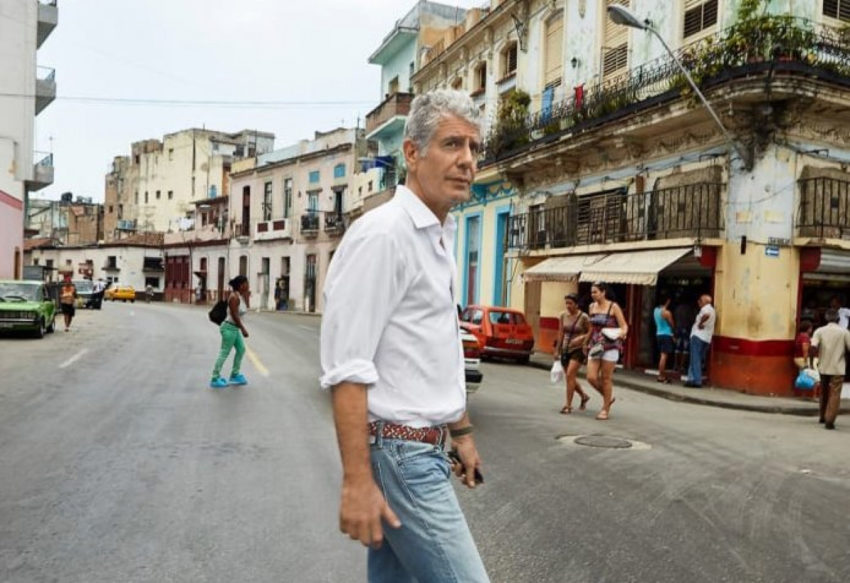
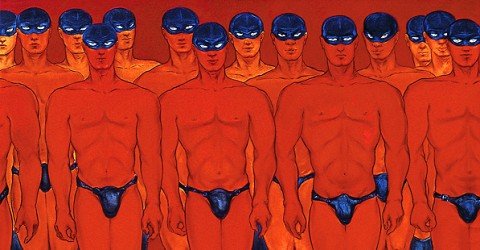




You must be logged in to post a comment.